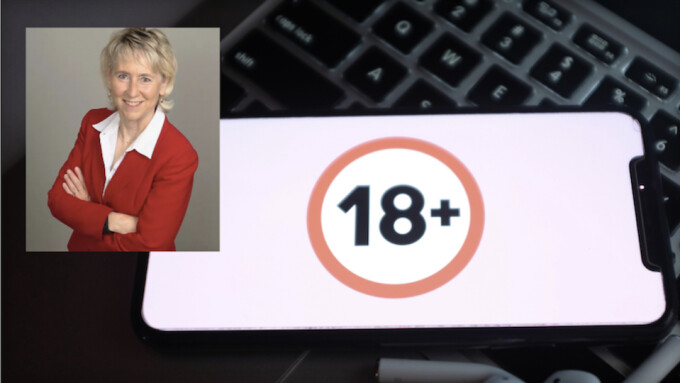SALT LAKE CITY — A Utah House of Representatives committee meeting yesterday to discuss a lawmaker’s proposal requiring all “new electronic devices” sold in the state to have pornography filters turned on by default featured a presentation by a representative of religiously-inspired anti-porn lobby NCOSE.
The bill in question, House Bill 72, was re-introduced last month by representative Susan Pulsipher (R-South Jordan). The bill, which Pulsipher had unsuccessfully attempted to introduce last year would mandate default “porn filters” onto phones and laptops sold in Utah.
If passed, the mandatory filters — from which for-profit, faith-based software companies have been profiting for some time — would have to be activated by default in 2022. According to analysts, international manufacturers of phones and computers like Apple or Google could face civil liability if they don't comply.
Utah politicians have made regular attempts to pass hard-to-enforce state bills allegedly to protect the citizenry from a made-up “public health crisis” around porn.
During yesterday’s hearing, Pulsipher invited a person identified by local media merely as a "director of public policy at the National Center for Sexual Exploitation.”
More specifically, however, this “expert witness” was Eleanor Gaetan, VP and director of public policy at the National Center on Sexual Exploitation (NCOSE), formerly known as Morality in Media, and the leading religiously-inspired national lobby waging the current War on Porn.
In 2015, Morality in Media — which has been fighting what they describe as “obscenity," including Sports Illustrated, Cosmopolitan and 18th century novels, since the 1960s — renamed itself “National Center on Sexual Exploitation.”
The NCOSE name has deceived journalists and politicians unfamiliar with their agenda, and seems to have been chosen to borrow legitimacy from the unrelated, but soundalike, National Center for Missing and Exploited Children (NCMEC), a respected, secular organization with no anti-porn agenda.
Gaetan was one of the leaders in setting public policy stigmatizing sex work as a George W. Bush appointee between 2003 and 2009. Her own press bio also boasts of having been “instrumental in passing major U.S. legislation, including SESTA-FOSTA.”
Scientifically Discredited Notions About 'Porn Exposure'
According to the Salt Lake City Fox affiliate, Gaetan “said that research demonstrates the link between porn exposure and detrimental effects on the brain” and declared her belief that “porn also puts individuals at increased risk for committing sexual offenses they witness.”
These scientifically discredited notions are routinely repeated by NCOSE and fellow War on Porn crusading groups like Exodus Cry and the Utah-based, Mormon Church-inspired Fight the New Drug.
Gaetan was joined by activist Chris McKenna, founder and CEO of Protect Young Eyes, a "porn block" business that would stand to profit from the passage of House Bill 72.
Protect Young Eyes sells their services based on their team’s background as “teacher, consultant, CPA, pastor, youth minister, IT support, marketer, scientist and parent.”
'Not Necessary and Unworkable'
But Pulsipher’s bill found some opposition during the hearing. “Many said HB 72 is problematic, poking holes in the legislation during Wednesday's hearing that ended with putting the bill on hold,” the Fox affiliate reported.
Cameron Demetre, executive director for California and the Southwest at TechNet, said that the blocking and filtering capabilities “just don't make this bill feasible, and compliance would not be possible.”
Carl Szabo, VP and general counsel at NetChoice, tried to explain that “the constitutional problems with this bill are numerous.”
Lisa McCabe with CTIA, a trade association for the wireless communications industry called the bill “well-intentioned” but “not necessary and unworkable.”
Dave Davis, president of Utah Retail Merchants Association, and Todd Bingham with the Utah Manufacturers Assocation, explained that “trying to restrict a manufacturer and make them liable for content on the device they sell is akin to making Sony or Samsung liable because a child got access to HBO on one of their devices” and that the bill “would constrict the supply of smart devices into Utah, because big manufacturers would not make uniquely configured devices. This would then push people to buy devices outside the state.”
'Copycat Bills' Expected
A compromise, after putting the bill on hold, was to “approve a bill substitute that states that the bill will not go into effect until five additional states have adopted similar language. It gives a 10-year period for that to occur.”
This suggests that NCOSE will now attempt to get “copycat bills” introduced in other conservative states, which has been their strategy in what religious groups have termed “Project Blitz.”
The most clear example of the “copycat bill” strategy concerning adult content is the passage of dozens of state-level resolutions declaring a fictitious “porn public health crisis” between 2016 and early 2020, when the actual COVID-19 crisis put those efforts on hold.
Utah's Ongoing Porn Obsession
As XBIZ has been reporting, Utah legislators spend much time and the western state’s limited resources introducing, debating and occasionally passing bills decrying “the scourge of pornography.”
Last year, the legislature passed a bill mandating that all adult content on the internet carry a specific warning label, under penalty of state fines.
This theatrical, almost-impossible-to-enforce bill was not signed by Governor Herbert, who let it die by exercising his “pocket veto” prerogative.
Herbert showed some practical restraint, in contrast with his 2016 signing of a resolution drafted by NCOSE declaring the existence of a dubious “public health crisis” around porn, and recommended that public health resources be spent training health care workers on how to combat it.
Representative Pulsipher's original draft of the “porn block” bill had been criticized by other state lawmakers back in October.
Pulsipher’s proposal to require smartphones and computers to have pre-installed porn-blocking software, and to have it activated as the default option when sold to Utahns, was quashed during a committee hearing at the state's Business and Labor Interim Committee.
According to public records, Representative Pulsipher's declared occupation is as a real estate appraiser. She appears to have no background in technology issues.
Main Image: Utah State Representative Susan Pulsipher (R-South Jordan). Photo: Utah House of Representatives.



